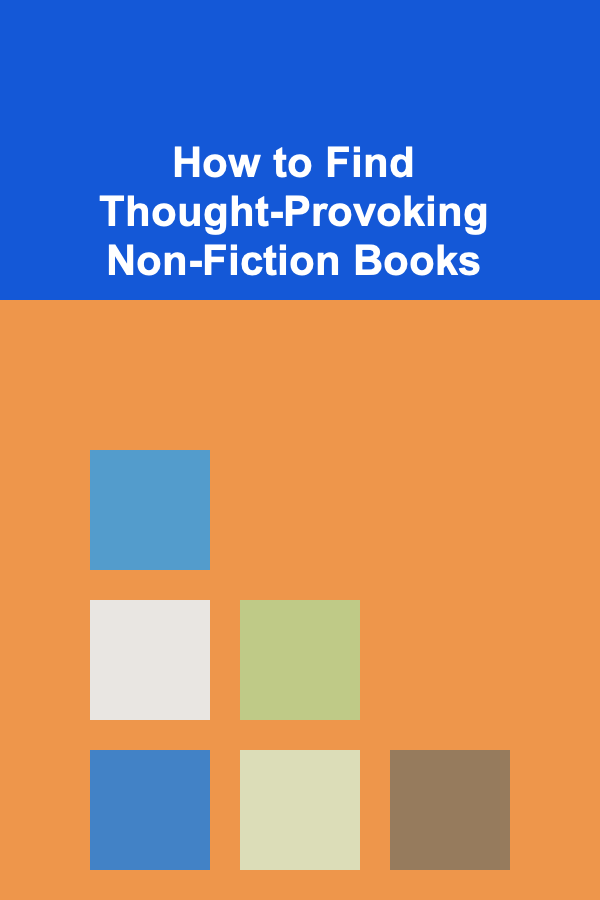
How to Find Thought-Provoking Non-Fiction Books
ebook include PDF & Audio bundle (Micro Guide)
$12.99$9.99
Limited Time Offer! Order within the next:

Non-fiction books have the power to enlighten, educate, and inspire. Whether it's a biography of an influential figure, an exploration of a historical event, a dive into scientific discovery, or a philosophical exploration of human nature, non-fiction books are tools that help readers better understand the world around them. However, finding books that stimulate deep thought, challenge your assumptions, or expand your knowledge can sometimes feel like an overwhelming task. With the vast ocean of non-fiction literature available, where should one begin?
This article will guide you through the process of finding thought-provoking non-fiction books. We'll explore how to identify such books, where to search for them, and how to discern quality and relevance. Whether you're a seasoned reader or someone who is just beginning to explore the world of non-fiction, this guide will provide you with valuable tips to cultivate a library of meaningful and impactful reads.
Understand What Makes a Non-Fiction Book Thought-Provoking
Before diving into the methods of finding these books, it's important to define what we mean by "thought-provoking." Thought-provoking non-fiction books are those that:
- Challenge your perspectives: They make you rethink ideas, challenge existing beliefs, and consider alternative viewpoints.
- Expand your knowledge: These books introduce new concepts, teach you something you didn't know, and deepen your understanding of complex subjects.
- Promote self-reflection: They often prompt you to think critically about yourself, society, and the world at large.
- Engage with universal themes: Great non-fiction often delves into topics that are universally relevant, such as ethics, justice, human rights, the nature of consciousness, or societal issues.
So, what should you look for in a book to determine whether it is thought-provoking?
Qualities of a Thought-Provoking Non-Fiction Book
- Depth of Research: Books that offer a detailed and comprehensive exploration of a subject tend to be thought-provoking. They go beyond surface-level information and invite readers to explore ideas in greater depth.
- Unique Perspective: A book that presents an unconventional or underrepresented point of view can be thought-provoking, as it challenges readers to reconsider their preconceived notions.
- Clear Argumentation: Thought-provoking non-fiction books usually present a strong argument, backed by evidence, that is compelling and difficult to dismiss.
- Narrative and Storytelling: While many non-fiction books are educational, those that also tell a story, whether through the life of a historical figure, a scientific journey, or an investigative report, can engage readers more deeply and make complex topics more accessible.
- Timeliness and Relevance: Books that deal with contemporary issues or timeless human questions tend to provoke deeper thoughts and discussions.
Know Your Interests and Areas for Exploration
The first step in finding thought-provoking non-fiction books is to have a clear sense of your interests. Non-fiction covers an incredibly wide range of topics, and understanding what excites or challenges you intellectually can guide your search.
Identifying Your Interests
- Ask Yourself What You Want to Learn: Are you interested in philosophy, psychology, history, science, politics, or personal development? Having a specific subject area in mind will help narrow down your search.
- Explore Your Curiosity: Sometimes, you may not know exactly what you want to learn, but you have a general curiosity about the world. Think about the questions or ideas that keep coming up in your daily life. Are you fascinated by artificial intelligence, climate change, social justice, or economics?
- Consider Your Personal Growth Goals: What areas of personal development are you aiming to improve? Books on emotional intelligence, time management, or mindfulness can be deeply thought-provoking and help with your self-improvement journey.
Understanding your intellectual curiosity will help you filter out books that don't resonate with your interests. But what if you're uncertain about what to dive into? Here's where external resources can be helpful.
Use Book Recommendations from Trusted Sources
Finding a good book often starts with recommendations. With so many books available, trusted recommendations can serve as a shortcut to discovering impactful reads. Here are some great places to find non-fiction book recommendations:
1. Book Reviews and Literary Magazines
Literary magazines and review sites often publish lists of notable non-fiction books, which are selected by critics and experts in the field. These reviews usually provide insight into why a book is important and what makes it compelling. Some popular literary magazines that publish reviews of non-fiction books include:
- The New York Review of Books
- The Paris Review
- The New Yorker
- The Guardian's Book Section
- Harper's Magazine
2. Online Book Communities and Websites
Websites like Goodreads , Book Riot , and Literary Hub offer curated lists of non-fiction books based on themes, popularity, and user reviews. Goodreads, in particular, allows you to filter books by specific interests, such as "thought-provoking," "philosophical," or "deeply researched," which can be helpful in locating books that challenge your perspectives.
3. Best-of Lists and Award Winners
Several organizations and publications curate annual lists of the best non-fiction books. These can be great starting points for finding impactful and thought-provoking reads. Some prestigious awards to look out for include:
- The Pulitzer Prize for General Nonfiction
- The National Book Award for Nonfiction
- The Baillie Gifford Prize for Non-Fiction
- The Kirkus Prize
Books that win or are nominated for these awards often tackle important issues with depth and originality, making them good candidates for those seeking stimulating non-fiction.
4. Recommendations from Thought Leaders
Many influential thinkers, professors, authors, and philosophers publish reading lists of books they find intellectually stimulating. These lists are often shared on social media, blogs, or in interviews. For instance, Tim Ferriss, Malcolm Gladwell, and Yuval Noah Harari are known for regularly recommending books that challenge conventional thinking.
5. Social Media and Podcasts
Platforms like Twitter , Instagram , and Reddit can be useful in finding book recommendations. Follow hashtags like #NonFictionBooks or #ReadingList, or join book discussion groups like r/Books on Reddit to engage in conversations about thought-provoking reads.
Podcasts are also an excellent source of non-fiction book recommendations. Shows like The Tim Ferriss Show , On Being , and The Art of Charm often feature in-depth discussions of books that challenge our assumptions and provoke deep thinking.
Explore Different Genres of Non-Fiction
There is a diverse range of non-fiction genres that cater to different intellectual curiosities. Exploring a variety of genres can help you discover books that are both informative and thought-provoking.
1. Biographies and Memoirs
Biographies and memoirs provide a detailed account of someone's life and experiences. These books often present unique perspectives on personal growth, historical events, and the human condition. A powerful biography can challenge your view of the world by offering insight into the lives of others who have overcome great odds or have had a profound impact on society.
Some thought-provoking biographies include:
- The Diary of a Young Girl by Anne Frank
- Educated by Tara Westover
- Steve Jobs by Walter Isaacson
2. History and Politics
Books in the history and politics genre give you a window into the past, helping you understand the present and its societal dynamics. Thought-provoking books in this category often deal with power, governance, and the human cost of historical events.
Notable books include:
- Sapiens: A Brief History of Humankind by Yuval Noah Harari
- The Second World War by Winston Churchill
- The Road to Serfdom by Friedrich Hayek
3. Philosophy and Psychology
Books that explore philosophy and psychology tend to challenge your perceptions about human nature, consciousness, ethics, and existence. These texts invite readers to examine deep questions about life, morality, and the mind.
Some examples of thought-provoking books in this genre are:
- Thinking, Fast and Slow by Daniel Kahneman
- Man's Search for Meaning by Viktor Frankl
- Meditations by Marcus Aurelius
4. Science and Technology
Science and technology books explore the wonders of the natural world and the innovations shaping our future. These books can provoke deep thought by uncovering the mysteries of the universe, the complexity of life, or the implications of technological advancements.
Books to consider include:
- Cosmos by Carl Sagan
- The Gene by Siddhartha Mukherjee
- Homo Deus: A Brief History of Tomorrow by Yuval Noah Harari
5. Self-Improvement and Personal Growth
Books on self-improvement focus on helping individuals live more fulfilling, mindful, and successful lives. These books can encourage readers to reflect on their personal growth, habits, and mindset.
Some impactful books in this genre are:
- Atomic Habits by James Clear
- The Power of Now by Eckhart Tolle
- Daring Greatly by Brené Brown
Stay Curious and Read Widely
The final piece of advice in finding thought-provoking non-fiction books is to remain intellectually curious and read widely. Be open to exploring new subjects, authors, and genres outside your comfort zone. Sometimes, a book that you wouldn't have considered reading can end up being the most thought-provoking of all.
Additionally, always take the time to critically engage with the book as you read it. Consider the arguments being presented, question the conclusions drawn, and reflect on how the ideas resonate with your life and experiences.
By staying open to diverse viewpoints, questioning assumptions, and exploring new ideas, you can cultivate a rich and thought-provoking reading experience that will challenge, enlighten, and inspire you for years to come.
Reading More From Our Other Websites
- [Home Holiday Decoration 101] How to Make Your Home Festive with DIY Holiday Decorations
- [Scrapbooking Tip 101] How to Customize DIY Scrapbook Templates for Every Occasion
- [Toy Making Tip 101] Seasonal Toy Workshops: Holiday-Themed Creations with Your Cricut Machine
- [Personal Investment 101] How to Understand the Importance of Location in Real Estate
- [Home Family Activity 101] How to Organize a Family Photo Album or Scrapbook
- [Home Soundproofing 101] How to Soundproof a Room Using Thick Curtains and Rugs
- [Stamp Making Tip 101] The Ultimate Toolkit: Essential Materials and Tips for Adult Stamp Makers
- [Needle Felting Tip 101] Step‑by‑Step Techniques: How to Use a Felting Foam Mat for Perfectly Shaped Fibers
- [Home Pet Care 101] How to Set Up a Play Area for Your Pet in Your Home
- [Organization Tip 101] How to Follow Up After Your Yard Sale: Donation and Cleanup

How to Design a Functional Essential Oil Station
Read More
How to Design a Space-Saving Nursery for Your Baby's Room
Read More
How to Keep Sound Out of a Room: Proven Techniques and Products
Read More
How to Organize Your Pantry and Keep It Clean
Read More
How to Use Car Detailing to Make Money
Read More
Designing Effective Handouts: A Comprehensive Guide
Read MoreOther Products

How to Design a Functional Essential Oil Station
Read More
How to Design a Space-Saving Nursery for Your Baby's Room
Read More
How to Keep Sound Out of a Room: Proven Techniques and Products
Read More
How to Organize Your Pantry and Keep It Clean
Read More
How to Use Car Detailing to Make Money
Read More